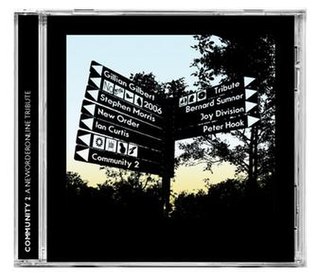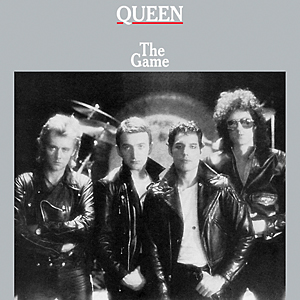France participated in the Eurovision Song Contest 2006 with the song with the song "Il était temps" written by Corneille Nyungura. The song was performed by Virginie Pouchain.

Community 2 is a tribute album dedicated to the work of Ian Curtis, Gillian Gilbert, Peter Hook, Stephen Morris and Bernard Sumner of the bands New Order and Joy Division that was released in 2006.
Malta participated in the Eurovision Song Contest 2009 with the song "What If We" written by Marc Paelinck and Gregory Bilsen. The song was performed by Chiara, who had previously represented Malta at the Eurovision Song Contest in the 1998 and 2005 edition where she achieved third and second place with the songs "The One That I Love" and "Angel", respectively. The Maltese entry for the 2009 contest in Moscow, Russia was selected through the national final GO Malta EuroSong 2009, organised by the Maltese broadcaster Public Broadcasting Services (PBS). The competition consisted of a semi-final round and a final, held between 8 November 2008 and 7 February 2009, where "What If We" performed by Chiara eventually emerged as the winning entry after scoring the most points from a jury in the first round and gaining the most votes from a public televote in the second round with 12,249 votes.

The Game is the eighth studio album by the British rock band Queen. It was released on 30 June 1980 by EMI Records in the UK and by Elektra Records in the US. The Game features a different sound from its predecessor, Jazz (1978). The Game was the first Queen album to use a synthesizer.
Denmark participated in and won the Eurovision Song Contest 2013 with the song "Only Teardrops" written by Lise Cabble, Julia Fabrin Jakobsen and Thomas Stengaard. The song was performed by Emmelie de Forest. The Danish broadcaster DR organised the national final Dansk Melodi Grand Prix 2013 in order to select the Danish entry for the 2013 contest in Malmö, Sweden. Ten songs competed in a televised show where "Only Teardrops" performed by Emmelie de Forest was the winner as decided upon through the combination of jury voting and public voting over two rounds.
Iceland participated in the Eurovision Song Contest 2013 with the song "Ég á líf" written by Örlygur Smári, Pétur Örn Guðmundsson. The song was performed by Eythor Ingi. The Icelandic entry for the 2013 contest in Malmö, Sweden was selected through the national final Söngvakeppnin 2013, organised by the Icelandic broadcaster Ríkisútvarpið (RÚV). The selection consisted of two semi-finals and a final, held on 25 January, 26 January and 2 February 2013, respectively. Six songs competed in each semi-final with the top three as selected by a public televote alongside a jury wildcard advancing to the final. In the final, the winner was selected over two rounds of voting: the first involved a 50/50 combination of jury voting and public televoting, which reduced the seven competing entries to two superfinalists and the second round selected the winner exclusively through public televoting. "Ég á líf" performed by Eythor Ingi emerged as the winner after gaining 67% of the public vote.
Hungary participated in the Eurovision Song Contest 2014 in Copenhagen, Denmark. Their entry was selected through the national competition A Dal, organised by the Hungarian broadcaster Magyar Televízió (MTV). András Kállay-Saunders represented Hungary with the song "Running", which qualified from the first semi-final and placed 5th in the final, scoring 143 points. It is the second best position ever for Hungary, after 4th place in their debut year 1994.
Slovenia participated in the Eurovision Song Contest 2014 with the song "Round and Round" written by Raay, Tinkara Kovač, Hannah Mancini and Tina Piš. The song was performed by Tinkara Kovač. Songwriter Hannah Mancini represented Slovenia in the Eurovision Song Contest 2013 where she failed to qualify to the final with the song "Straight into Love". Slovenian broadcaster Radiotelevizija Slovenija organised the national final EMA 2014 in order to select the Slovenian entry for the 2014 contest in Copenhagen, Denmark. Seven entries competed in the national final where the winner was selected over two rounds of public televoting. In the first round, the top two entries were selected. In the second round, "Round and Round" performed by Tinkara Kovač was selected as the winner.
Cyprus participated in the Eurovision Song Contest 2015 with the song "One Thing I Should Have Done" written by Mike Connaris and Giannis Karagiannis and performed by Karagiannis. The Cypriot broadcaster Cyprus Broadcasting Corporation (CyBC) returned to the Eurovision Song Contest after a one-year absence following their withdrawal in 2014 due to financial and budget restrictions, and organised the national final Eurovision Song Project in order to select the Cypriot entry for the 2015 contest in Vienna, Austria. The national final featured 54 entries competing in a nine-week-long process, resulting in the selection of Karagiannis with "One Thing I Should Have Done" at the final on 1 February 2015, where six entries remained.
Hungary participated in the Eurovision Song Contest 2015 with the song "Wars for Nothing", written by Áron Sebestyén, Boglárka Csemer and Sára Hélène Bori. The song was performed by Boggie. The Hungarian broadcaster Media Services and Support Trust Fund (MTVA) in collaboration with the Hungarian public broadcaster Magyar Televízió (MTV), organised the national final A Dal 2015 in order to select the Hungarian entry for the Eurovision Song Contest in Vienna, Austria. Following a six-week long selection process, Boggie emerged as the winner with the acoustic guitar driven ballad "Wars for Nothing". In the first of the Eurovision semi-finals "Wars for Nothing" placed eighth out of the 16 participating countries, securing its place among the 27 other songs in the final. In Hungary's thirteenth Eurovision appearance on 23 May, "Wars for Nothing" finished in twentieth place, receiving 19 points.
Estonia participated in the Eurovision Song Contest 2015 with the song "Goodbye to Yesterday" written by Stig Rästa. The song was performed by Elina Born and Stig Rästa. The Estonian broadcaster Eesti Rahvusringhääling (ERR) organised the national final Eesti Laul 2015 in order to select the Estonian entry for the 2015 contest in Vienna, Austria. The national final consisted of three shows: two semi-finals and a final. Ten songs competed in each semi-final and the top five from each semi-final as determined by a jury panel and public vote qualified to the final. In the final, the winner was selected over two rounds of voting. In the first round, a jury panel and a public vote selected the top three to qualify to the superfinal. In the superfinal, "Goodbye to Yesterday" performed by Elina Born and Stig Rästa was selected as the winner entirely by a public vote.
Cyprus participated in the Eurovision Song Contest 2016 with the song "Alter Ego" written by Minus One and Thomas G:son. The song was performed by the band Minus One, which was selected by the Cypriot broadcaster Cyprus Broadcasting Corporation (CyBC) in November 2015 to represent Cyprus at the 2016 contest in Stockholm, Sweden. The Cypriot song, "Alter Ego", was presented to the public on 22 February 2016.
Hungary participated in the Eurovision Song Contest 2017. The local Media Services and Support Trust Fund (MTVA) and the Hungarian broadcaster Duna Media Service organised the national final A Dal 2017 in order to select the Hungarian entry for the 2017 contest in Kyiv, Ukraine.
Greece participated in the Eurovision Song Contest 2017 with the song "This Is Love" written by Dimitris Kontopoulos, Romy Papadea and John Ballard. The song was performed by Demy, who was internally selected by the Greek broadcaster Hellenic Broadcasting Corporation (ERT) to represent Greece at the 2017 contest in Kyiv, Ukraine. Demy was announced at the Greek representative on 13 January 2017, while a national final was held in order to select the song she would perform. Three songs competed in the national final on 6 March 2017 and a combination of international jury voting and public voting selected "This Is Love" as the winning song.
Moldova participated in the Eurovision Song Contest 2017 with the song "Hey Mamma" written by Anton Ragoza, Sergei Ialovitski, Sergey Stepanov, Mihail Cebotarenco and Alina Galetskaya. The song was performed by the group SunStroke Project. The Moldovan broadcaster TeleRadio-Moldova (TRM) organised the national final O melodie pentru Europa 2017 in order to select the Moldovan entry for the 2016 contest in Kyiv, Ukraine. 40 entries competed to represent Moldova in Kyiv, with 14 being shortlisted to participate in the televised national final after auditioning in front of a jury panel. After a semi-final and final which took place on 24 and 25 February 2017, "Hey Mamma" performed by SunStroke Project emerged as the winner after gaining the most points following the combination of votes from a jury panel and a public televote.
Greece participated in the Eurovision Song Contest 2018 with the song "Oniro mou" written by Aris Kalimeris, Dimitris Stamatiou, Yianna Terzi and Mihalis Papathanasiou and performed by Terzi. A national final was scheduled to be held in order to select the Greek entry for the 2018 contest in Lisbon, Portugal. Five entries were to compete in the final on 22 February 2018 where public voting would exclusively select the winner, however "Oniro mou" performed by Terzi was announced as the Greek entry on 16 February 2018 following the disqualification of four out of the five national final entries.
Estonia participated in the Eurovision Song Contest 2018 with the song "La forza" written by Mihkel Mattisen, Timo Vendt, Ksenia Kuchukova and Elina Nechayeva. The song was performed by Elina Nechayeva. The Estonian broadcaster Eesti Rahvusringhääling (ERR) organised the national final Eesti Laul 2018 in order to select the Estonian entry for the 2018 contest in Lisbon, Portugal. The national final consisted of three shows: two semi-finals and a final. Ten songs competed in each semi-final and five from each semi-final as determined by a jury panel and public vote qualified to the final. In the final, the winner was selected over two rounds of voting. In the first round, a jury panel and a public vote selected the top three to qualify to the superfinal. In the superfinal, "La forza" performed by Elina Nechayeva was selected as the winner entirely by a public vote.
Estonia participated in the Eurovision Song Contest 2019 with the song "Storm" written by Stig Rästa, Vallo Kikas, Victor Crone and Fred Krieger. The song was performed by Victor Crone. The Estonian broadcaster Eesti Rahvusringhääling (ERR) organised the national final Eesti Laul2019 in order to select the Estonian entry for the 2019 contest in Tel Aviv, Israel. The national final consisted of three shows: two semi-finals and a final. Twelve songs competed in each semi-final and six from each semi-final as determined by a jury panel and public vote qualified to the final. In the final, the winner was selected over two rounds of voting. In the first round, a jury panel and a public vote selected the top three to qualify to the superfinal. In the superfinal, "Storm" performed by Victor Crone was selected as the winner entirely by a public vote.
Estonia originally planned to participate in the Eurovision Song Contest 2020 with the song "What Love Is" written by Uku Suviste and Sharon Vaughn. The song was performed by Uku Suviste. The Estonian broadcaster Eesti Rahvusringhääling (ERR) organised the national final Eesti Laul 2020 in order to select the Estonian entry for the 2020 contest in Rotterdam, Netherlands. The national final consisted of three shows: two semi-finals and a final. Twelve songs competed in each semi-final and six from each semi-final as determined by a jury panel and public vote qualified to the final. In the final, the winner was selected over two rounds of voting. In the first round, a jury panel and a public vote selected the top three to qualify to the superfinal. In the superfinal, "What Love Is" performed by Uku Suviste was selected as the winner entirely by a public vote.



